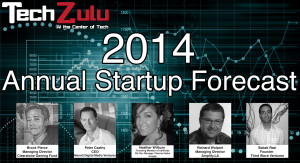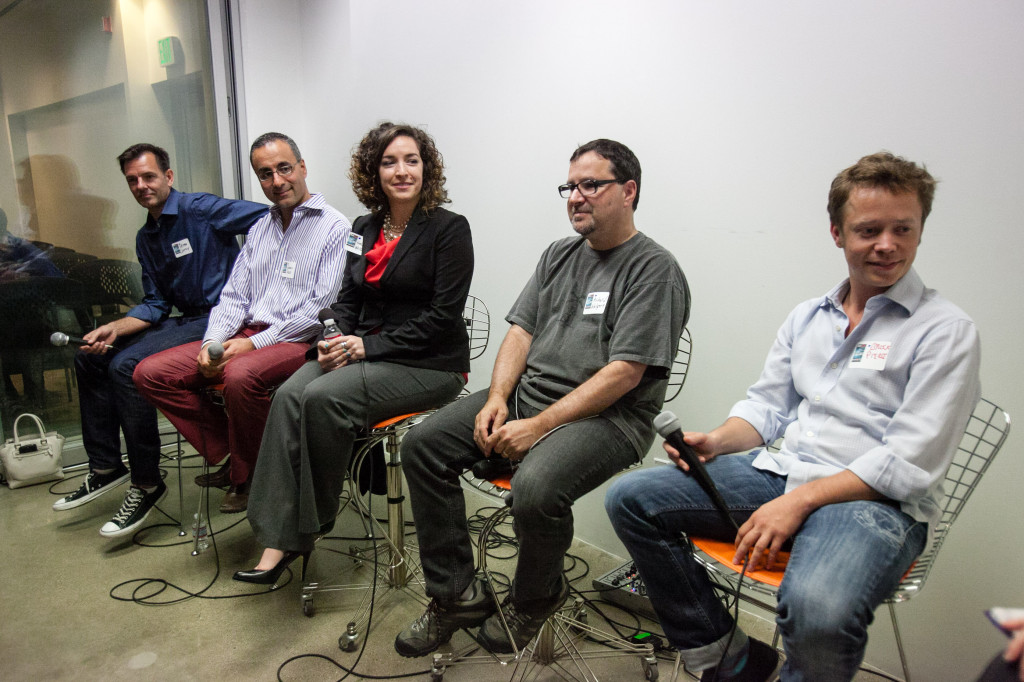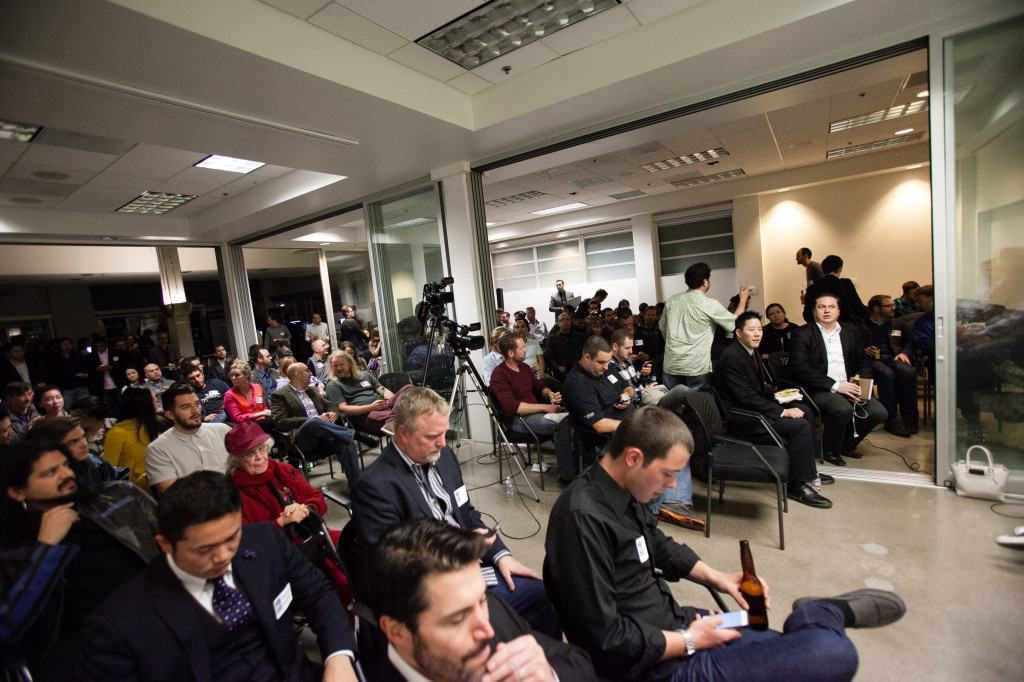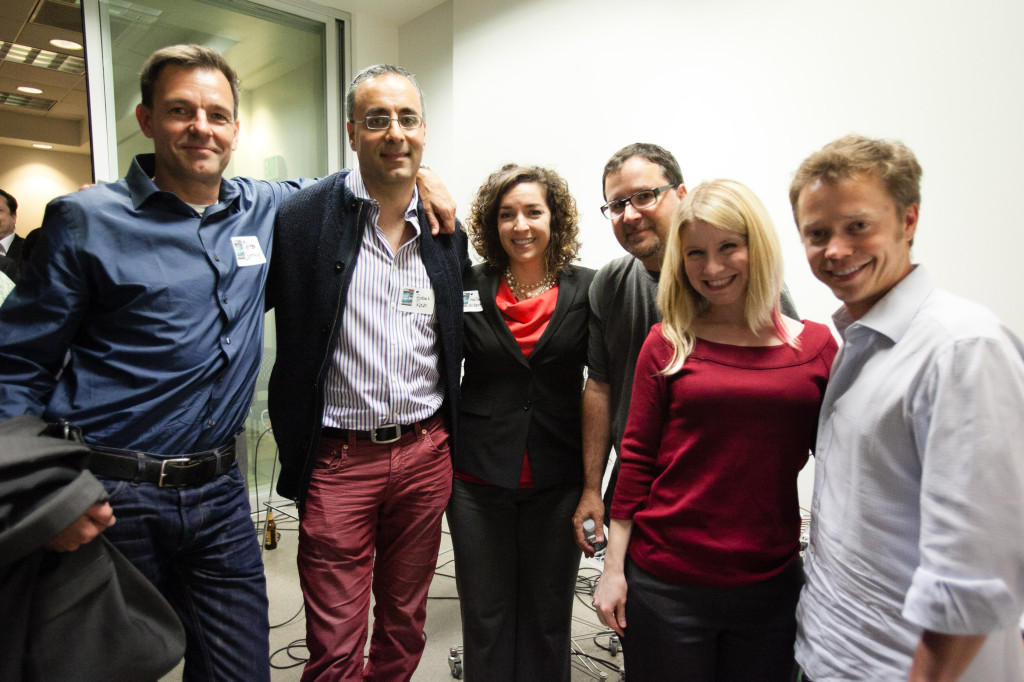TechZulu Recaps: The Annual Startup Forecast
 The Annual TechZulu Startup Forecast is one of our most anticipated events.
The Annual TechZulu Startup Forecast is one of our most anticipated events.
It’s about as close as you can get to a macro-level crystal ball for the tech industry, expressed through a rapidfire string of insights from the minds of some of tech’s biggest investors, founders, and gamechangers.
This year’s TZ #startupforecast (Jan 28, 2014) was no exception. In a short, densley packed timeline, our panel of industry experts discussed the fine line topics of wearables technology, bitcoin, SaaS, cloud, mobile gaming, and social markets.
But within the discussion (and this is the part we really love) they displayed an intimate knowledge of their respective fields, fed off each other to discuss interconnected trends, and collaborated to provide our intensively-focused audience a macro-to-micro snapshot of what 2014 (and beyond) holds.
Before we continue any further, with our friends at Bittrader, we’d like to formally thank our amazing speakers for taking the time to share their thoughts. Speakers listed:
- Brock Pierce – Digital currency pioneer investing in Bitcoin, games, and online gambling businesses like the best Florida online gambling sites; Clearstone Global Gaming Fund
- Peter Csathy – CEO Manatt Digital Media Ventures, accomplished media and digital media entrepreneur
- Richard Wolpert – Managing Director of Amplify.LA, startup incubator and Venture Advisor at Accel Partners
- Babak Razi – Founder of Third Waves Ventures, innovator and supporter of emerging high technologies
- Heather Wilburn – Founding Member of AdWords Program & Biz Dev Manager for Channel Sales team at Google
In addition, we had a fully stacked line up of showcasing startups with Causora, Floshare, Kiosked, and Yekra.
For a full breakdown of each of our speakers’ backgrounds, visit our event info site!
For those who missed the sold out event, shame on you (just kidding, we’re sorry to have missed you).
Get yourself up to speed by reading through JATI, Inc.’s fantastic Twitter recap of the event or reading through our editors’ Cliff’s Notes version of the engaging evening.
Summary of Topics
2014 looks to be the year of emerging technologies (wearables, bitcoin, etc.) and the night’s intellectual festivities began with just that discussion.
How do VC’s actually know when an emerging technology is going to be promising?
Surprisingly, our participating VC’s (Babak Razi and Robert Wolpert) stated plainly that they ” bet on people.” According to them, visions need to be in line, but pivots happen so often that technical talent and leadership often times end up being the two biggest ingredients for success.
Of course, when you’re talking about enabling/emerging technologies, as Brock Pierce puts it, “Market timing is critical to success.” He alludes to some of the projects he’d been a part of in the past that failed to hit perfect timing. In his experience, being too early can be even worse than being too late. “The 2nd mouse gets the cheese.” He believes now is the time for Bitcoin’s critical mass – when he first discovered it, it was still too early.
However, Wolpert reminds us that early bets don’t necessarily indicate future failures. The conversation shifts over to the work Heather Wilburn is doing with Google AdWords. For as long as Google’s been a ubiquitous part of the internet, its enhanced campaigns have been its biggest change since launching AdWords. The company hopes to prepare advertisers for varying screen sizes.
Peter Csathy jumps in to answer questions about content. He doesn’t see many digital media VC firms in the space and makes it a point to invest in and work with companies who engage more deeply with content. To him, the right technology has the ability to make content creation and storytelling by providing the right context.
Big or Bust?
Our next segment included a mixture of panel impressions and audience reactions. Big or bust?
The internet of things. *Audible chuckles but some heads nod*. Verdict? It’s both. Wearables are undeniably becoming a larger part of the consumer technology landscape. According to comments from our panelists, despite the ultra-limited usage of wearables (literally no one in the audience, nor panelists), they are perhaps still ahead of their time and it’s still too early to tell.
The more intriguing topic becomes what’s happening around the products. Smartwatches, even Glass, are acquiring data on a user’s physical life to provide health benefits. Razi, (as a reminder, focuses on emerging technologies) mentions the industrial internet of things. Companies are steadily positioning themselves by acquiring data across other different industries. What’s important here is that the data is being collected.
Wilburn provides a solid reminder for our listeners. Even with Google, the creators might not even realize what the hidden potentials are for their products and services. She reminds us that whole ecosystems have been built on seemingly innocuous ideas. So instead, there can be a focus on enabling the public to expand on these baseline ideas.
Let’s Talk Bitcoin
Up to this point, Bitcoin’s been somewhat the nervous elephant in the room. The audience lets out a collective sigh of relief when our narrator, Amanda Coolong, brings Bitcoin to the forefront. According to Pierce, Bitcoin is well on its way and is an almost direct reflection of where the internet was in 1991.
The discussion includes the role these digital currencies will play in developing countries, where they’ll have the ability to skip over traditional (and slow) development cycles for progress. Think of Africa’s leapfrogging over tradtional telecom with the introduction of affordable cellular technology. Kind of like that, but with money.
Pierce mentions the bigger potential of the technology beyond currency, diving into its role as a decentralized network. To him, those impliciations are huge as we start to see more technologies built on top of this idea.
Some quick numbers: In 2013, $100M was invested into Bitcoin-related ventures. Projection for 2014? 5x that.
What’s on the Horizon?
As we enter our final stretch, we start with 3d printing. Panelists Csathy and Pierce both agree that 3d printing has the ability to hugely disrupt global supply chains and remind us it’s already being done with toys, cars, even houses having been 3d printed. Verdict: It’s going to be huge.
Topics shift from physical to communication. As we enter a world where social media is increasingly becoming less private, users are becoming exposed in new ways. Though it might seem depressing to expect a world where we’ve given up our privacy, Wilburn and Wolpert offer a more optimistic approach, focused on awareness and learning best practices.
Enabling Social Change
Considering one of our demo companies, Causora, is in the business of fostering social change, the topic comes up with a question of whether we’re seeing an overall shift towards widespread awareness… perhaps through the spreading of festival culture?
Peter Csathy takes the lead on this one. Through mobile engagement, users are now more empowered than ever to actually create campaigns and take action. And in business we’re seeing a growing presence of entrepreneurs who are incorporating social change into their business models. He mentions double and triple bottom-lined companies and tells us investors are starting to require metrics to see measurable social and global value.
Wolpert and Raki provide additional insights: globalization and technology allow us to take action on issues we care about. Raki mentions that one of his biggest lessons learned over time is to the importance of creating commonality in culture. (We’re also reminded that companies themselves are embracing culture and shared values). To round off their sentiments, Csathy adds in that festivals, music, and shared culture enable us the ability and drive to create social change.
And beneath all that? Technology to empower people to create communities around their causes.
Is Micro-Investing the Future?
Next up, another big question on everyone’s minds: how is the JOBS Act going to impact the investment world? Overall sentiment, there’s going to be a lot more money, but as a result, much more scamming. And if not more scamming, then we’ll see a “rollercoaster of a ride” (according to Wolpert) where many unqualified investors will make bad investments.
The Audience Inquires
And finally, we have three discussion questions from our audience to round off the evening. They touch upon the following:
- Wearables and Google’s role in pushing adoption. Wilburn and the rest of our panel agree that a hockey stick won’t take place until there’s a killer app and technology. Until then, we’ll be focused on gimmicky applications and entertainment.
- Bitcoin and the closure of nefarious exchange site, Silk Road. Pierce reminds us that even with the closure of Silk Road, the price of Bitcoin didn’t drop, but rose. A good indicator that the currency can, and is, being used for other things.
- An audience member brings up education. Csathy takes the lead and hints at a company on the horizon that’s working on combining gamification with education. A great tip, as we enter an era of newly emerging education models, distance learning, and higher education.

















